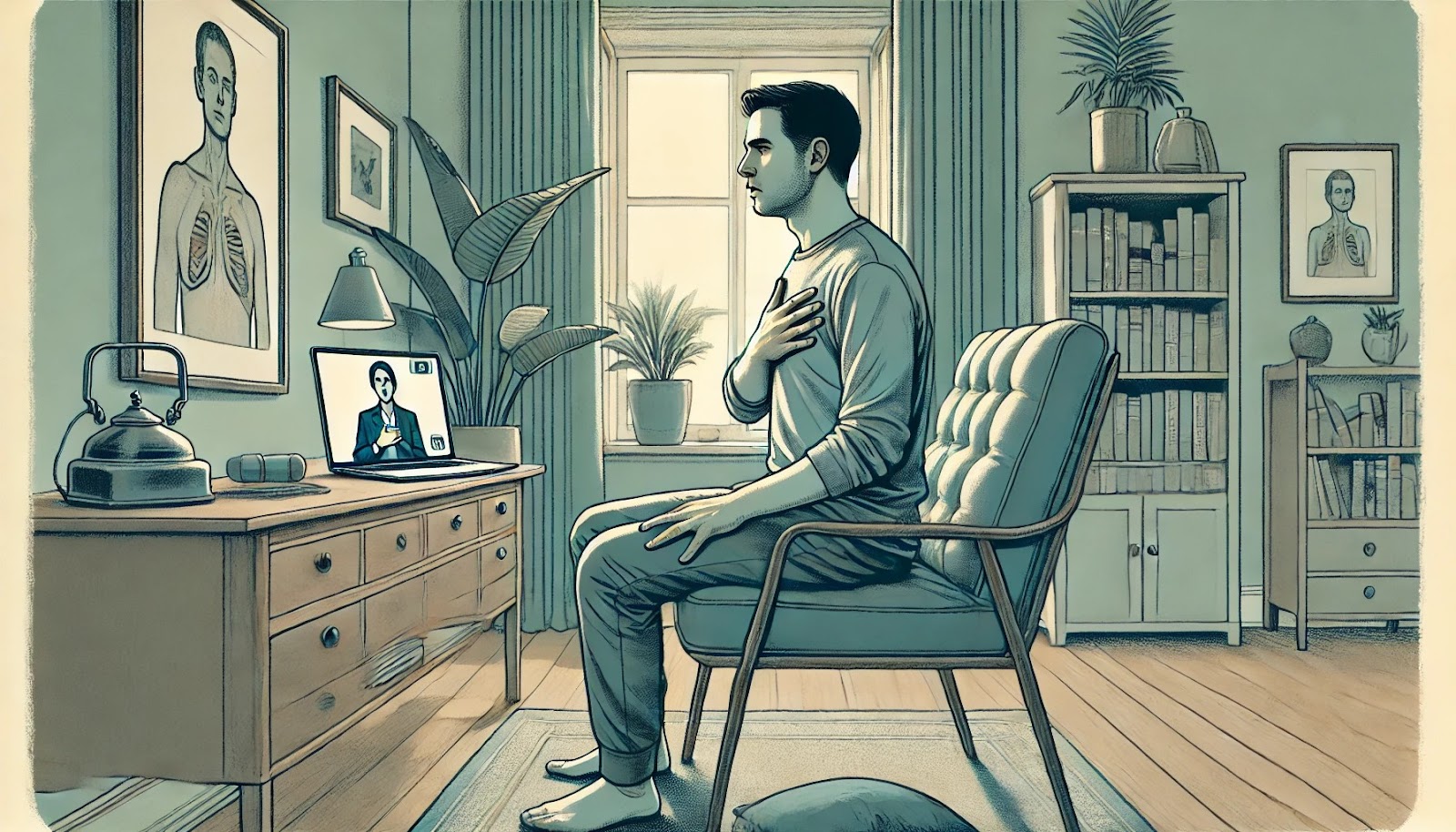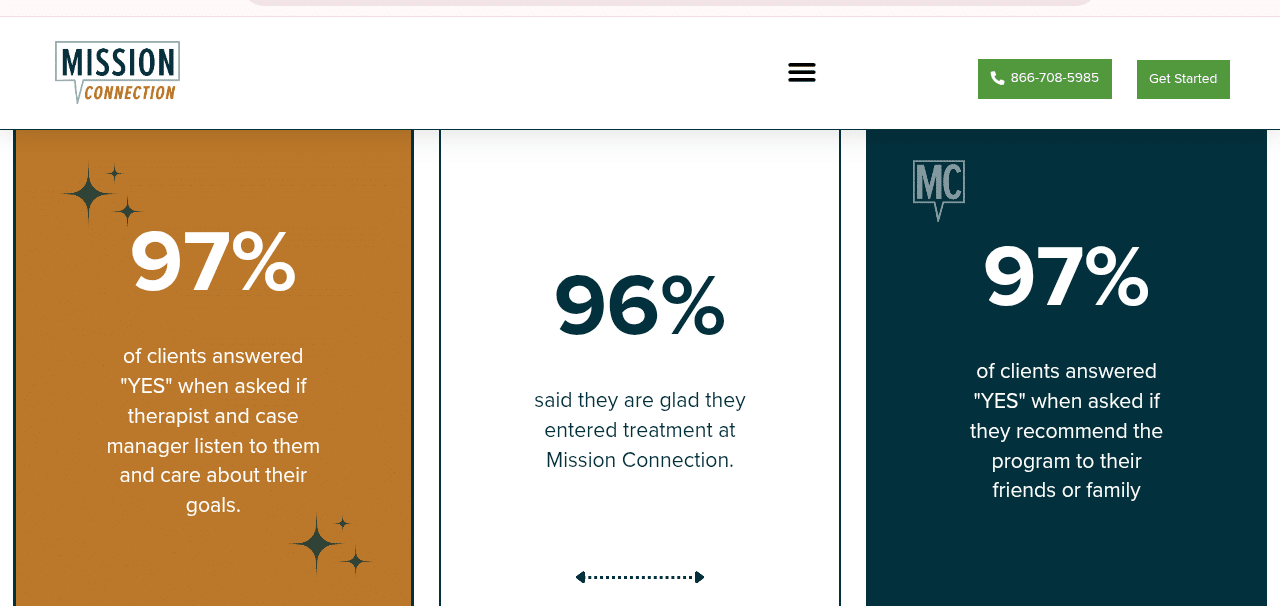
Key Takeaways
- Virginia virtual therapy offers flexible mental health support with the same professional standards as traditional therapy, allowing you to attend sessions from the comfort of your home.
- Online therapy is more cost-effective than in-person sessions since it tends to have lower session fees and you don’t have to spend money commuting.
- Virginia residents can access a variety of therapeutic modalities online, including CBT and DBT.
- Mission Connection provides comprehensive outpatient mental healthcare with both in-person and telehealth options, featuring licensed professionals, insurance acceptance, and a 96% client satisfaction rate.
Virginia Virtual Therapy
Virtual therapy in Virginia is a growing field, offering residents the ability to access mental health services without geographical limitations. This form of therapy uses digital platforms to connect therapists and clients, while maintaining the same professional standards as traditional therapy. The benefits of virtual therapy are numerous, but you must understand how it works and what to expect.
The Basics of Online Therapy

The primary goal is to offer the same therapeutic support and guidance as in-person sessions, but with added convenience. For many, the ability to attend therapy from their own space can enhance the therapeutic experience, making it more personal and comfortable.
State Regulations and Licensing
In Virginia, online therapists must be licensed to practice in the state. This ensures that they meet the necessary qualifications and adhere to professional standards. Verify the credentials of any therapist you consider as this impacts the quality and legality of the therapy provided.
Many therapists will display their licensing information on their websites, but you can also verify with the Virginia Board of Counseling.
Mission Connection offers flexible outpatient care for adults needing more than weekly therapy. Our in-person and telehealth programs include individual, group, and experiential therapy, along with psychiatric care and medication management.
We treat anxiety, depression, trauma, and bipolar disorder using evidence-based approaches like CBT, DBT, mindfulness, and trauma-focused therapies. Designed to fit into daily life, our services provide consistent support without requiring residential care.
Why Choose Virtual Therapy?
Flexibility and Convenience
You can schedule sessions around your commitments, be it work, school, or family. There’s no need to commute, which saves time and reduces stress. This flexibility means therapy can fit seamlessly into your life, rather than being an additional chore.
Also, virtual therapy can be a game-changer for those with physical disabilities or chronic illnesses that make travelling difficult. It removes the barriers of location and mobility, making mental health support more accessible.
Privacy and Anonymity
Virtual therapy provides a level of anonymity that traditional settings might not. You can attend sessions from a private space, without the worry of being seen entering a therapist’s office.
This can be particularly important in small communities where maintaining confidentiality is crucial.
Cost-Effectiveness
Virtual therapy can also be more cost-effective than traditional therapy. Without the need for physical office space, therapists may lower their fees. Additionally, there’s no need for travel, which can save on transportation costs.
For those concerned about the financial aspect of therapy, virtual options can be a more affordable alternative.
Access to Specialists
Online therapy opens doors to specialists who may not be available locally. This access ensures that you receive the highest quality care, customized to your specific needs.
Improved Patient Outcomes
The flexibility and accessibility of virtual sessions mean that you can engage in therapy consistently, which is crucial for progress. Also, the comfort of attending sessions from home can reduce anxiety associated with visiting a therapist’s office, allowing you to open up more freely.
This can lead to more honest communication and a deeper therapeutic process, ultimately enhancing the effectiveness of the therapy.
How Do Online Therapy Services Work
User Registration
User registration usually involves creating an account. During this process, you’ll provide basic information and consent to the platform’s terms of service. Registration is straightforward and designed to be user-friendly so that you can start your therapy journey with ease.
Once registered, you’ll often be asked to complete an intake form. This form gathers information about your mental health history, current concerns, and therapy goals. It’s a step that helps your therapist understand your needs and adjust their approach accordingly.
Initial Assessment
After registration, you’ll typically undergo an initial assessment. This assessment helps the therapist understand your situation and determine the best course of action.
It may be an online assessment or may involve a detailed conversation about your mental health history, current challenges, and what you hope to achieve through therapy. The assessment is a collaborative process, allowing both you and the therapist to establish a clear understanding of the therapeutic goals.
Matching Process
The matching process ensures you connect with a therapist who suits your needs. Many online therapy platforms use algorithms to match clients with therapists based on the information provided during registration and assessment. This can include factors like the therapist’s area of expertise, their therapeutic approach, and your personal preferences.
It’s about finding the right fit, someone you feel comfortable with and who can effectively support your mental health journey. If the initial match doesn’t feel right, most centers offer the flexibility to try different therapists until you find the perfect match.
Session Scheduling
Once matched with a therapist, the next step is scheduling your sessions. Online therapy makes scheduling easy, with flexible options to fit your routine—including early mornings, late evenings, and weekends.
The ease of scheduling allows you to prioritize your mental health without sacrificing other commitments. Also, it ensures that therapy becomes a regular part of your routine, rather than a sporadic event.
Technical Requirements
To participate in virtual therapy, you’ll need a reliable internet connection. This ensures your sessions are smooth and uninterrupted. Most platforms recommend a broadband connection for optimal video quality.

Ensure your device has a functioning camera and microphone, as these are crucial for effective communication during sessions.
It’s advisable to familiarize yourself with the platform before your first session. Your therapist is also there to assist with any issues, ensuring your focus remains on the therapeutic process.
Therapeutic Techniques Used Online in Virginia
Cognitive Behavioral Therapy (CBT)
Cognitive Behavioral Therapy (CBT) helps you identify and change negative thought patterns and behaviors.
It’s especially effective for anxiety and depression because it teaches you how to challenge unhelpful beliefs and replace them with healthier ones. CBT is structured, goal-oriented, and hands-on—perfect if you want practical tools and clear steps to improve your mental health.
Many online therapy centers offer CBT, providing you with the flexibility to engage in therapy from the comfort of your home.
Dialectical Behavioral Therapy (DBT)
Dialectical Behavioral Therapy (DBT) is particularly effective if you’re dealing with emotional regulation and interpersonal issues. DBT combines CBT techniques with mindfulness practices so that you can develop skills to manage intense emotions.
DBT sessions often include skills training in four key areas: mindfulness, distress tolerance, emotion regulation, and interpersonal effectiveness. These skills empower you to handle challenging situations successfully and build healthier relationships.
Mindfulness-Based Therapy
Mindfulness-Based Therapy focuses on cultivating awareness and acceptance of the present moment. This technique is highly effective for reducing stress and anxiety, as it encourages you to let go of judgment and openly embrace your experiences.

Mindfulness-based therapy works well online, with therapists offering guided meditations and exercises through virtual sessions. This makes it easy to integrate mindfulness practices into your daily routine and boost your well-being.
Finding the Best Virtual Therapy Center
Reading Reviews and Testimonials
Reading reviews and testimonials from other clients can provide valuable insights into the quality of a therapy center. Look for feedback on the effectiveness of the therapy, the professionalism of the therapists, and the overall experience with the center. Positive reviews can indicate a reputable and reliable service.

Keep in mind that everyone’s experience with therapy is unique, so use reviews as a guide rather than a definitive measure of quality. Look for common themes in the feedback, such as the center’s responsiveness, ease of scheduling, and the therapists’ ability to build rapport with clients.
Trial Sessions
Many virtual therapy centers offer trial sessions or initial consultations, which can be a great way to assess if a therapist is a good fit for you. Use this opportunity to ask questions, discuss your concerns, and get a feel for the therapist’s approach. A trial session can help you determine if the therapist’s style aligns with your preferences and if you feel comfortable opening up to them.
Insurance and Payment Options
Check if the center accepts your insurance, as this can significantly reduce out-of-pocket costs. Many therapy centers provide information about insurance coverage on their websites or can assist you in verifying your benefits.
If insurance is not an option, inquire about alternative payment plans or sliding scale fees, which adjust the cost of therapy based on your financial situation. Some centers also offer package deals for multiple sessions, which is cost-effective over time.
Why Choose Mission Connection for Your Virtual Therapy Journey

This means you can access professional mental health treatment when, where, and how it works best for your life. What truly sets us apart is our proven track record of success.
We also accept numerous insurance plans and offer affordable payment options to ensure quality mental health care remains accessible to all. Don’t let geographical limitations, busy schedules, or privacy concerns prevent you from getting the support you deserve.
With centers in California, Virginia, and Washington, we are ready to meet you wherever you are on your mental health journey with compassionate, effective care.
Call Today 866-833-1822.
Frequently Asked Questions (FAQ)
What technology do I need for online therapy?
To participate in online therapy, you’ll need a reliable internet connection and a device with a camera and microphone, such as a computer, tablet, or smartphone. Most therapy platforms also require you to download an app or use a web-based service for video calls. Ensure your device is compatible with the platform and test your setup before your first session.
Can I switch therapists if I am uncomfortable?
Yes, if you’re not comfortable with your current therapist, you can switch to another one. Most therapy platforms offer the flexibility to try different therapists until you find the right fit.
How is my privacy protected during sessions?
Online therapy platforms use encryption and secure technology to protect your privacy during sessions. Therapists are also bound by confidentiality agreements and ethical guidelines to ensure your information is kept private.
Is online therapy covered by insurance in Virginia?
Many insurance plans in Virginia do cover online therapy, though coverage varies by provider and plan. It’s recommended to check with your insurance company to understand what services are covered and any potential out-of-pocket costs. Mission Connection works with numerous insurance providers and can help verify your benefits.







